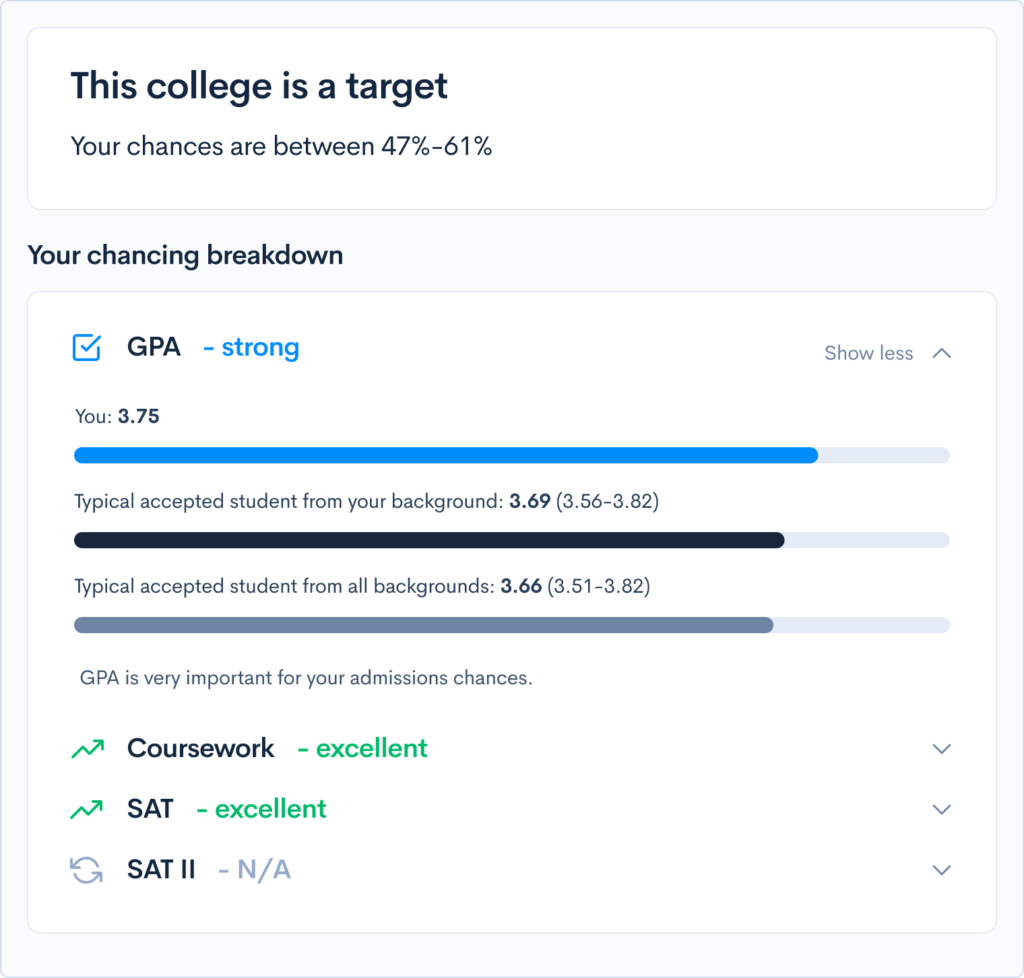Honors vs. AP Classes: What’s the Difference?
What’s Covered:
- What Are Honors Classes?
- What Are AP Classes?
- Honors vs. AP Classes
- Which Is Best For You?
- How Much Do Advanced Classes Impact Your College Chances?
Your ability to succeed in a challenging curriculum is one of the most important factors admission committees consider when making their decisions. They want to see whether you can handle a rigorous course load, as you’ll be expected to do as a college student.
Honors and Advanced Placement (AP) courses are two common types of rigorous courses that high school students pursue to demonstrate their college readiness and high achievement. While both can show that you’re up to the challenge of excelling academically, they differ in a number of ways.
What Are Honors Classes?
Often, high schools offer both honors and regular versions of the same courses. In some cases, particularly with specialized courses where there aren’t enough students to fill two sets of classes, there may only be one version. Therefore, honors counterparts are not always available at every school.
While the content of the two versions usually overlaps in many respects, the honors track is typically more rigorous and accelerated. Students in honors classes also learn with other high-achieving students.
The content of honors courses is dictated by the teacher, school, and/or district; there is no standardized, nation or state wide curriculum.
What Are AP Classes?
The College Board’s AP program, meanwhile, consists of college-level courses that follow a prescribed curriculum. Courses fall into categories including arts, English, history and social sciences, math and computer science, sciences, and world languages and cultures. Additionally, the College Board offers the Capstone and Diploma Program, which consists of Seminar and Research courses.
Each year-long AP course is meant to be equivalent to a semester-long college course. At the culmination of the course, students typically take a standardized test and earn a grade of one to five (five being the highest). Many colleges award credit for grades of four or five (three in some cases) for certain subjects. If AP courses are not available at the student’s high school, they can self-study and take the exam with the potential of earning credit independently.
Honors vs. AP Classes: Key Differences
1. Availability
This varies by high school, but typically, honors courses tend to be more widely available than AP courses. Plus, there are generally honors courses available at different levels of the same subject, while AP courses are, with some exceptions, only available at one level for each subject. For example, you might have the opportunity to take Honors French II, III, and IV, but there is only one AP French Language and Culture.
2. GPA
Again, this varies by school, but usually, AP courses are weighted an extra point, (so an A would be a 5.0 or a 4.0 scale), while honors courses are weighted an extra half-point (an A equalling a 4.5) or not weighted at all.
3. Difficulty
While both types of courses are challenging, AP courses tend to be more difficult. This is why most students usually take them when they’re high school juniors or seniors, although it’s not unheard of for freshmen and sophomores to take certain APs, too.
4. Curriculum
AP courses have a standardized curriculum for teachers to follow, and the test will evaluate students’ knowledge of the content of this curriculum. Honors courses, on the other hand, are not standardized but left up to the discretion of the teacher, school, and/or district.
5. Exams
Particular AP exams take place on specific dates in May and June. Students from different schools sit for the test at the same time to prevent cheating. Honors exams take place according to the individual school’s schedule. Moreover, like the curriculum, the AP exam is standardized, while honors exams are not.

6. College Credit
Depending on the college you attend and the subject of the AP exam you take, you may be able to earn college credit for AP scores of three, four, or five. Even if you earned an A in an honors course, you won’t receive college credit, although it could be used to help determine placement.
7. Eligibility
You’ll usually be recommended for or placed in an honors course by your teacher or school. This can begin as early as middle school. Oftentimes, taking honors courses early in high school will put you on a path to take APs your junior and senior year. While students are also often recommended for AP courses by their teachers, technically anyone can take an AP exam as long as it’s being administered at a school or location you can access.
Which Is Best for You?
Top colleges will expect to see you take AP courses and exams. Whenever possible, you should take AP courses over honors equivalents. However, be careful to balance your schedule and not overwhelm yourself by overloading on APs.
You should also consider your intended major. If there’s an honors course relevant to your interests and strengths but no AP, it’s better to take the honors course in a strong subject than an irrelevant AP in a weaker one.
How Much Do Advanced Classes Impact Your College Chances?
Your willingness and ability to tackle a challenging, advanced curriculum will certainly improve your chances of gaining admission to top schools. In fact, if they’re available at your high school, colleges will expect to see plenty of honors and AP classes on your transcript. (Remember, though, that they won’t penalize you if your school doesn’t offer advanced courses; you’ll be judged in the context of the curriculum that is available to you.)
Wondering just how much taking an advanced course load will impact your odds of success? CollegeVine’s free chancing engine will predict your chances of admission using factors like the rigor of your curriculum, your grades, your test scores, and your extracurriculars. You’ll also receive tips to improve your profile.


